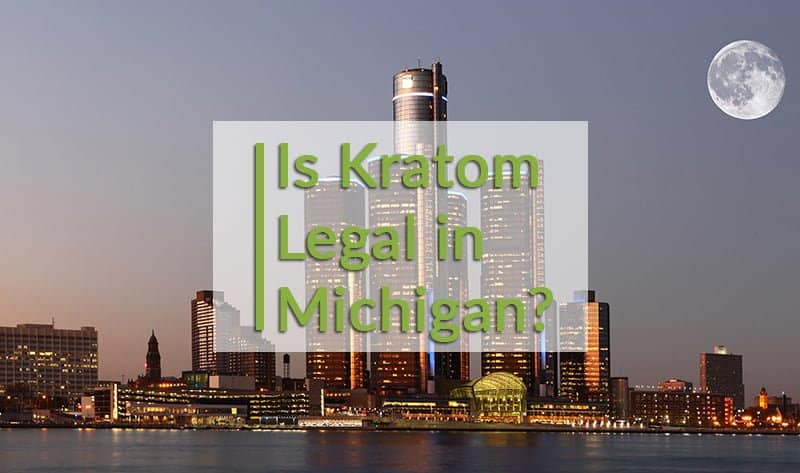
Is Kratom Legal in Alabama in 2023?
March 28, 2019Michigan State borders four of the Great Lakes and has 11,000 inland lakes. You can even buy merchandise such as tote bags and T-Shirts with the slogan “Land of 11,000 Lakes”.
Its largest city, Detroit, is home to the headquarters of three large car companies: Ford Motor, General Motors, and Chrysler. Therefore, many refer to Detroit as The Motor City or The Car Capital of the World.
While cars and lakes are great, how about kratom? Is the Land of 11,000 Lakes kratom-friendly?
Is Kratom Legal in Michigan?
Currently, kratom is legal in Michigan. There have been efforts to ban and regulate kratom. However, none of the bills has succeeded.
First, there was a bill in 2014. It aimed to add kratom to the Michigan Controlled Substances Act. Sponsors suggested amending the Schedule V list and placing kratom in it.
Schedule V includes drugs that have medicinal use but relatively low abuse potential in comparison with other drugs. They include medicines that contain codeine, ephedrine, opium, and similar substances.
Codeine is an opiate or, in other words, a substance that derives from opium. Being less regulated than other illegal substances with high abuse potential, codeine is considerably easier to get access to. As a result, it’s more likely to cause dependence and addiction.
Kratom does not belong in this category.
Over the years, kratom has often been referred to as an opioid, including by the Food and Drug Administration (FDA). The FDA has repeatedly used this as an argument to achieve a kratom ban on a federal level.
Yet, such a reference isn’t accurate. While kratom has some opioid-like properties, it isn’t an opioid. It also isn’t related to the opium poppy. Moreover, the Kratom 8-Factor Analysis from 2017 has stated that exposure to kratom caused low respiratory depression and hadn’t led to any deaths.
Instead, the Southeast Asian tree kratom, scientifically known as Mitragyna speciosa, belongs to the Rubiaceae plant family. Therefore, it’s actually related to a product many of us consume daily – coffee. Studies have also confirmed that the likelihood of getting addicted to kratom is equivalent to the likelihood of getting addicted to coffee, i.e., very low.
The FDA has since changed its verbiage and no longer refers to kratom as an opioid. It now describes kratom as a herb with opioid-like properties.
Kratom Activism and Further Efforts to Ban Kratom
In response to the 2014 bill, over 1,700 people signed a petition to keep kratom legal in the state of Michigan. Eventually, the bill died.
Almost simultaneously, the same person who had filed it sponsored another bill. Its objective was to prohibit kratom sales to minors. However, this new bill died, as well.
Kratom remained legal, yet unregulated. Therefore, the risk of getting access to contaminated or adulterated kratom remains.
Efforts to Ban Kratom in 2019
On August 20th, 2019, a Republican Senator who also is a medic by profession introduced a bill with the intent to schedule kratom. Had it passed, kratom would have become a Schedule II drug and would have required a doctor’s prescription.
Classifying kratom as a Schedule II drug would have been even more inaccurate. This category has illegal substances with high abuse potential and accepted but highly restricted medicinal use. Examples of Schedule II drugs in Michigan are opium, cocaine, morphine, methamphetamine, medical marijuana, and more.
The bill’s sponsor explained his decision by stating that kratom is addictive and dangerous. He also stated that its side effects include seizures, psychosis, and hallucinations. He added that those who would like to transition from opioids with the help of kratom should seek professional help.
The bill eventually died.
Hopefully, UF College of Pharmacy is going to find more proof of the beneficial properties of kratom through their research. We need more scientifically proven and non-biased data on kratom. This would help prevent people like the aforementioned medical professionals from using their education and position to spread false claims about kratom.
Life-Changing Kratom Experiences
While many want to see kratom banned in Michigan, not everyone opposes kratom leaf. One of such individuals is Trish Richards, a Michigan graphic artist in her late 30s.
Having suffered in a car accident, Trish became dependent on pain medication. When her doctor stopped prescribing them eight months later, physical discomfort and depression kept crippling her life.
Trish sought illegal medication from street dealers. She discovered that some of the pills she was sold were fake and suspected others to have been laced with fentanyl. Seeking pain relief she wasn’t getting from her healthcare provider, she had become a drug user. It was neither good for her health nor her well-being.
A friend introduced her to kratom, and she hasn’t looked back ever since. Kratom has helped her feel the best she’s had in a long time.
Richards is just one of several million Americans with positive kratom stories. Yet, FDA refers to kratom as a drug of concern fueling negative news headlines and encouraging politicians to ban it. A great example of this is Detroit news stating that “people are using kratom to get high.”
Once again, this is inaccurate information about kratom. According to the Kratom 8-Factor Analysis, kratom does not possess such properties.
The American Kratom Association is determined to change that. It’s actively working to prevent kratom bans and spread positive and scientifically accurate information about kratom.
The American Kratom Association and the Michigan Kratom Consumer Protection Act
The American Kratom Association, or the AKA for short, is a Virginia-based non-profit activist group. It’s aware of the Food and Drug Administration’s willingness to ban kratom. Unlike the FDA, the AKA wants to ensure that kratom remains legal, regulated, and accessible to the public.
The AKA believes that the best way to accomplish this is by regulating kratom products. It’s trying to achieve that with its initiative – the Kratom Consumer Protection Act.
The Kratom Consumer Protection Act (KCPA) is legislation that regulates kratom manufacturing, distribution, and sales.
While states can modify the content of the KCPA, the standard regulations developed by the AKA include the following:
- Prohibiting kratom to minors,
- Prohibiting vendors from selling contaminated, adulterated, fake, or low-quality kratom,
- Adequately testing and labeling kratom products,
- Providing ingredient and alkaloid content on labels, and
- Establishing penalties such as fines and jail time for not complying with the regulations.
The AKA lobbies this legislation in various states and a number of them review it each year. The KCPA is already a law in several US states. This includes Nevada, Utah, Georgia, Arizona, and Oklahoma.
In 2018 and 2019, Michigan was considering the KCPA. Under it, the Michigan Department of Agriculture and Rural Development would have enforced the regulations.
Unfortunately, the bill did not take effect. Mitragyna speciosa is still legal in the state, but it is unregulated. This leaves it to be the responsibility of locals to look for trusted vendors that sell pure kratom.
Where to Buy Kratom in Michigan?
One can purchase kratom products such as powder and capsules in smoke shops, vape stores, and head shops across Michigan. However, if you are a Michiganite, we do not recommend buying kratom in local shops.
While it may be a quicker option, many local businesses do not have the necessary knowledge on kratom. They often advertise it incorrectly to boost sales. This contributes to people believing that kratom is a deadly drug and the authorities pushing a kratom ban.
Instead, buy kratom online from trustworthy vendors who follow ethical practices and test their products for quality and purity in independent 3rd-party laboratories.
For more recent information and an updated map on kratom legality across the United States, check out this blog post.








